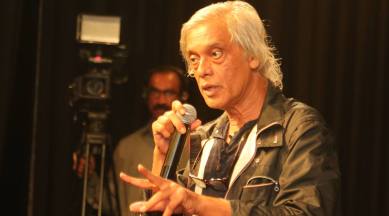Click here to follow Screen Digital on YouTube and stay updated with the latest from the world of cinema.

Sudhir Mishra stands at the end of the INOX Odeon theatre in New Delhi, a tall, straight figure, watching the politics of the day with all its mayhem and machinations, unspool on screen — much in the manner he has kept a watch over the changing nation in his four-decade career in filmmaking. This time he has put rumour and its power to unleash destruction at the centre of his new film Afwaah, featuring Nawazuddin Siddiqui and Bhumi Pednekar.
In recent years, rumour has been the beast that has unleashed vigilantes and mobs over various issues — possession of beef, “love jihad”, child abductions. “A rumour is like a weapon of mass destruction. You can spread a rumour and it becomes viral so quickly today. What is the truth? A rumour spreads so fast, because there’s no place to hide. It breeds in an atmosphere of stupidity and blind belief and it exists everywhere,” says Mishra. “My issue is with lies. I’m not interested in whether people marry each other or not. This film is actually not about love jihad, or about beef. It is about rumour-mongering. It’s about how rumours spread,” adds the director.
Making films on the realities around us comes with its own perils but Mishra is not too concerned about it. “I made Hazaaron Khwaishein Aisi in 2005 and we showed the Emergency in a straight-forward way. There was no pulling of punches, there was no side-stepping. I’m not here to sensationalise, I am here to make a point and the point is quite limited. I am a filmmaker and more qualified people than me can give an analysis of what’s happening around us now but for me, the element of fear and the fact that now almost anybody can be a victim, there is no basis for it… If that happens, then society will go for a toss, because anyone can be targeted… For instance, if you said terrorism is wrong, it’s correct, but you can’t just pick just anybody for it, no? There are two different things,” he says. Mishra, who started as scriptwriter and assistant director for Jaane Bhi Do Yaaron (1983), has directed critically acclaimed films such as Yeh Woh Manzil To Nahi (1982), Dharavi (1991), Yeh Saali Zindagi (2011) and Serious Men (2020).
The right to have a view and also to engage with the other is what Mishra firmly believes in, which is why he recorded a podcast with The Kashmir Files director Vivek Agnihotri, which releases on May 4. The meeting came about after a few Twitter exchanges. Last week, Mishra had tweeted, ”Liberals complain about Kashmir Files. Why? Vivek Agnihotri made a film and his audience came to theatres and saw it. But when we make films our audience who criticise Vivek sit on their a**e and don’t come to the theatre.” Agnihotri had responded saying there should be an open debate on this, an invitation Mishra accepted. “I think it’s good to see films and make films of all sorts. I have a disagreement with how The Kashmir Files has been used. I am a filmmaker who has a different aesthetic but if somebody says Vivek is not allowed to make Kashmir Files, I will stand with him. Every film should be made,” says Mishra, adding that we should look at what made the audience connect with the film.
“It’s better to know what’s bubbling in a society rather than to not know. There are feelings which are dormant and sometimes people express those feelings through going to see a film like The Kashmir Files. You cannot reject them. You have to listen to them. You have to create an atmosphere where films of a different nature are made and people go and see them and not necessarily like all of them but to interact with different ways of seeing, not merely formulaic ways of seeing,” he says.
Click here to follow Screen Digital on YouTube and stay updated with the latest from the world of cinema.